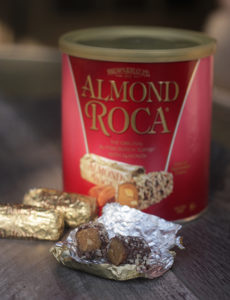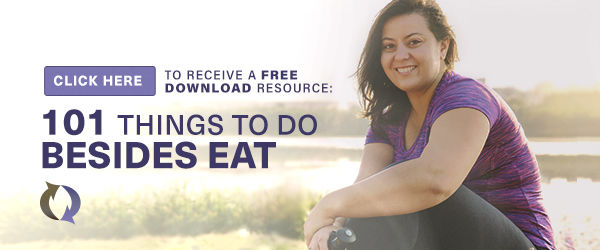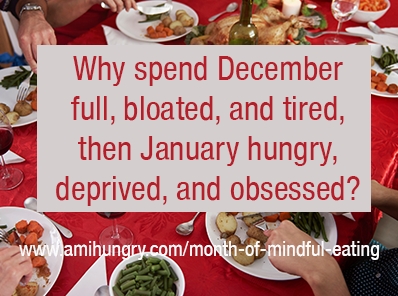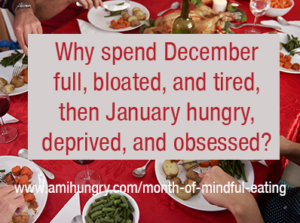Do fear and threats lead to behavior change? Parents seem to think so! This time of year, you often hear, “Be good or Santa won’t bring you any presents!” That may stop a child in their tracks, but does this threat change their behavior long term?
 Probably no better than, “Be good! You have to weigh in next week!” or “Be good or you’ll get diabetes!”
Probably no better than, “Be good! You have to weigh in next week!” or “Be good or you’ll get diabetes!”
The entire conventional system of managing eating and exercise behavior is built on compliance with a predetermined set of guidelines out of fear of the consequences.
There are even guidelines for how to get around the guidelines during the holidays!
“Be good or else” is an outside-in approach with a threat built in: “If you’re not good, you’ll __________ (fill in your favorite dreaded threat here: gain weight… never find a partner… die)!”
Fear doesn’t lead to behavior change
You might think these threats help you stick to a diet or exercise plan, but you’ve probably noticed they don’t. In fact, fear is a poor long term motivator. Not only doesn’t fear doesn’t always work to change our behavior – sometimes it even backfires.
Back in my yo-yo diets days, the holidays were an endless minefield of threats. I was still practicing medicine back then, so I avoided the break room because I knew there would be all kinds of treats and I was afraid of losing control.
Finally, about mid-morning after half-dozen urgent visits for colds and flu, I’d finally let myself sneak back to the break room to see what goodies had shown up. That is how I discovered Almond Roca.
 To this day, that round pink container filled with gold-foil wrapped chocolate and almond covered toffee makes me salivate! (Reminder to self: Salivation is NOT a sign of hunger!) But back then, it went something like this:
To this day, that round pink container filled with gold-foil wrapped chocolate and almond covered toffee makes me salivate! (Reminder to self: Salivation is NOT a sign of hunger!) But back then, it went something like this:
I’ll just have one piece of Almond Roca instead of the apple I brought for my snack. Let’s see… how many calories is in one of these things? Oh, wait, it says a serving size is 3 pieces. I better have three so I don’t have to do the math.
One hour and three more patient work-ins later: “Looks like lunch is going to be late, if I even have time! I’ll just have a few more pieces of Almond Roca to tie me over… Oh no! They’re almost gone; I guess I’m not the only one who loves them! I better take a few extra, but I won’t eat them now.” Which of course I did, but it didn’t matter because another container or another platter of goodies would take their place the next day.
And each evening I would think, “I feel gross! Why was I so bad today? Why don’t I have any self-control?”
On and on this went all December. At some point, I’d decide it was futile and I’d just have to start fresh in the new year.
Then, come January, I denied, deprived, and eventually defied my way through the next year. Until December when I just gave up completely again.
Feeling bad doesn’t lead to behavior change
During the many years I’ve been teaching people how to use the Mindful Eating Cycle to recognize their eat-repent-repeat cycle, I’ve heard stories like mine too many times to count!
Most people don’t realize that threats of negative consequences don’t help them do anything differently. In fact, they often just trigger guilt, rebellion, and giving up!
So I ask you, why spend all of December bloated, full, and tired, and then spend January feeling hungry, deprived, and obsessed?
Don’t be good, feel good!
Fear and threats don’t lead to long-term behavior change with children, so why would they work with adults? They don’t.
Fear is a short term motivator, intended to protect us from immediate danger. In fact, the physiological state induced by chronic fear and stress leads to long term health and psychological consequences. External and internal threats to “be good or else” are actually counter-productive to our overall well-being.
Motivation for sustainable change comes when the choices you make feel good. Eating the foods you love in moderation, moving your body, and practicing self-care all lead to positive feelings that reinforce the choices you are making.
Our Am I Hungry? mindful eating programs take a comprehensive approach to eating and self-care that focuses on changing thoughts and feelings first, so changes in behaviors will last.
Now, seeing that pink container of Almond Roca is no longer a trigger for me. It is simply a favorite holiday treat I’ll enjoy mindfully when I choose. Each piece of the chocolate covered toffee brings me pleasure without a plan to pay penance. I don’t experience any urgency to have more than two or three pieces; why ruin the pleasure by feeling bad?
And that feels good!
Updated from a previously published version.
Enjoyed this article? Here are three more to help you:
Three Ways to Handle Triggers for Holiday Overeating
Handling Holiday Eating and Stress: A Recipe for Mindful Eating
Rewrite Those Ridiculous Holiday Eating Tips



